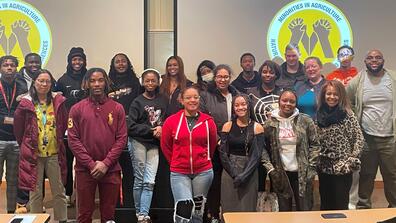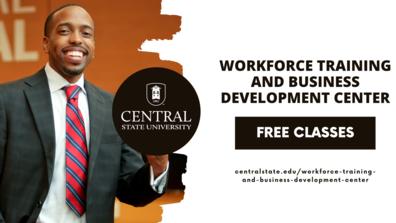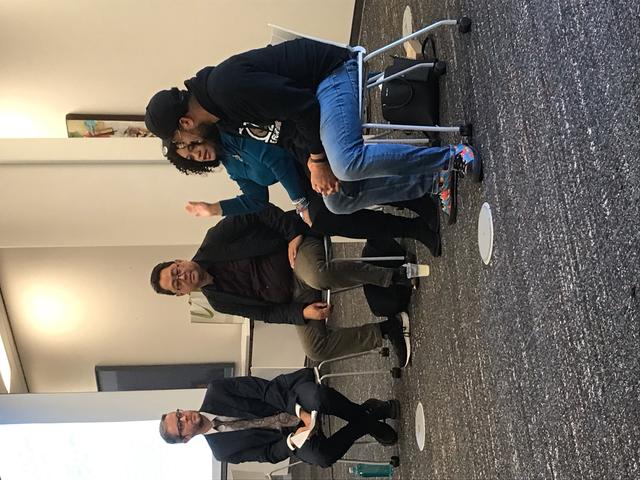
Central State University partners with University of Cincinnati on comics studies showcase event
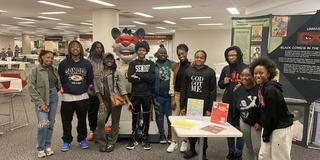
Above: Students gather for a photo at a comics event kickoff organized by the University of Cincinnati and Central State University at the Langsam Library on Nov. 9. Pictured are (from left) Olivia Jackson, Rylee Mays, Ethan Fields, Aerin Austin, Korey Rios, Kylethia Edgecombe, Samantha Charles, George Bain, Jiaire Driskell, and Eden Raven.
Central State University students studying comic books and graphic novels will be presenting their semester-long research work at a free public event on the campus of the University of Cincinnati (UC) later this month.
“From the Page to the Public Arena: How Comic Books, Graphic Novels, and Superheroes Shape the American Experience,” which includes Marauders and UC undergraduates and graduate students as contributing participants, will take place from 10 a.m. to 5 p.m. Monday, Nov. 27, in the Tangeman University Center (2600 Clifton Ave.).

As part of their work in Comics and Graphic Novels, a class instructed by Associate Professor of English and Coordinator of Interdisciplinary Studies Vincent Haddad, Central State students will share and discuss origin stories of their own Black superhero comic book characters. In the vein of interdisciplinary studies so inherent to Haddad’s class, the students will also have an opportunity to expand their presentations with explorations of pertinent social issues embedded in said comic characters’ origin.
Throughout the full-day event, other activities beyond the student presentations will include a roundtable panel discussion of industry professionals; a keynote speaker, Myron Strong, Ph.D.; and a drawing workshop led by cartoonist Stephen Kroeger. The event will also spotlight the comic book arts and studies exhibit “Unmasked: Black Heroes in Comics,” originally established by and housed at Central State’s National Afro-American Museum & Cultural Center.
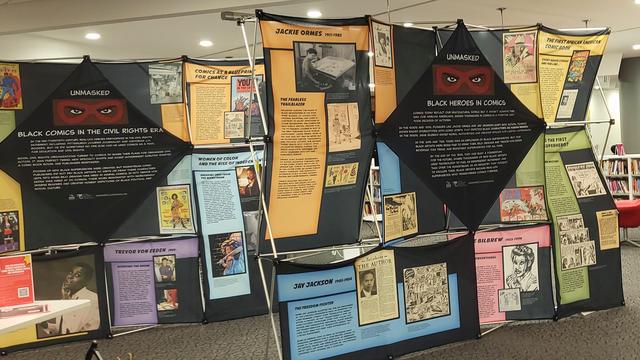
That exhibit was first moved to UC and premiered through a public presentation in the campus’ Walter C. Langsam Library on Nov. 9. It will remain in the library’s fourth-floor Digital Resource Commons until Dec. 8.
After UC professor Mark Raider, Ph.D., saw the “Unmasked” exhibit at the Afro-American Museum last summer, he suggested to Haddad that they collaborate on producing and moderating an intercollegiate comics studies event. This was the first spark of inspiration leading to the upcoming “From the Page to the Public Arena.”
Bringing comics to Central State
Two years ago, Haddad created and began teaching the class from which Marauders will join in on the collaborative day of comics studies events at the end of the month.
“This semester, I wanted to focus on two themes,” Haddad said. “We’ve been talking about Black superheroes and social issues related to them, and we’ve been learning about the history of Milestone.”
Milestone is a comics company that creates and publishes books focusing on Black characters whose history, going back to 1993, has been fraught with a tremendous degree of turmoil, fits of starts and stops, and recent revitalization by current parent company, DC Comics.
“When Dr. Raider approached me this past summer about the collaborative event, he was thinking about between our two schools; the pressure of that helped me shape how I would teach this semester’s class,” Haddad said. “I wanted to figure out a way to teach the class so that students, in their day-to-day schoolwork, would be successful in being able to present at the event.”
In setting them up for success, it was important for Haddad to create a long-form project students could work on in class that would help them to learn, express themselves creatively, and be able to represent themselves well at the public gala ahead.
“Also, because our students are at an HBCU and UC is a PWI, a primarily white institution, I wanted to give our students a vehicle to represent their community on a larger level in the hopes they could teach something about that to the students in Cincinnati,” Haddad added.
“In this case, in creating their own Black superheroes, they have the opportunity to speak on something they know very well — their own character that they’ve made up themselves — but also any larger issues pertaining to that character they may want to delve into, as well."
"It’s not always easy to talk about these societal topics directly, but can be more accessible through literature or, in this case, the realm of comic book characters.” — Vincent Haddad, associate professor of English and coordinator of Interdisciplinary Studies
Black superheroes and social issues
Considering the history of Black superheroes often being “burdened,” so to speak, with the requirement of having to engage with social issues of the day versus white superheroes who, as Haddad put it, “have more freedom to go up into outer space and have adventures where they’re just sort of ‘playing in the sandbox,’” Haddad wanted to allow students to create and discuss characters that don’t connect in any direct way with such sociopolitical topics.
“When I brought up this idea,” Haddad observed, “a number of my students perked up and said, ‘Really? They don’t have to deal with any of that stuff?’”
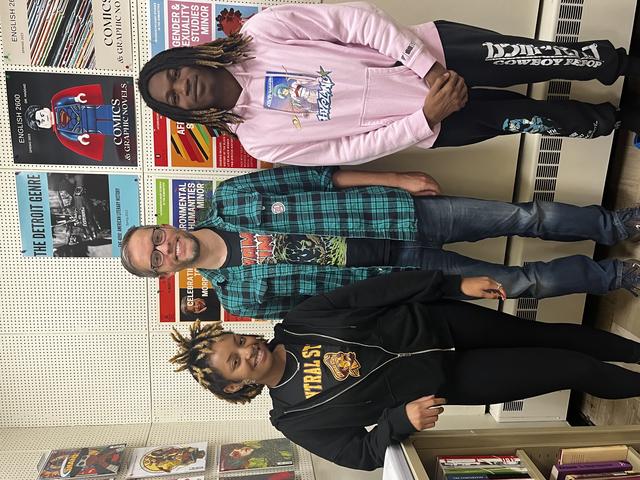
Of the 30 Marauders in Haddad’s class, 20 will present their research projects on Black superheroes and 10 will participate as supportive spectators. In bringing his students to the UC campus for this event, Haddad’s goal is that they will take part in an immersive learning event that they won’t forget.
“At first, I signed up for this class because it fit into my schedule and it sounded like fun,” said Olivia Jackson, a Chicago-born Honors College student junior majoring in English with a concentration in Pre-Law who transferred to Central State this semester. “I’m not a huge comic book or graphic novel person, but I do have some interest in superheroes and that sort of thing. I figured I would learn more about those topics and have really enjoyed learning about Milestone and how it was created by Black people. That was a cool touch, to be sure.”
“I love superheroes and stuff, and so this class really appealed to me when I first heard about it,” said Detroit native Ethan Fields, a sophomore majoring in Communications. “I’ve actually learned a lot more in this class than I thought I would when I first got here.
“I thought it would be an easy class to kind of drift through, and it’s definitely been less stressful than a lot of my other classes,” Fields continued. “But I’ve gotten much more out of it than I thought I would, for sure. Like, the other day, I learned that Batman’s creators were Jewish. I did not know that! Or learning about Milestone definitely, has been great because I’ve been able to read about superheroes who look much more like myself.”
Fields is looking forward to delivering what he referred to as his “lightning talk” — basically an “elevator pitch” about his superhero and its origin story — at the upcoming event.
“I’ve always loved superheroes, but to be so involved in it really gives you a different perspective on everything,” Fields said.
The healing power of comics
Jackson’s character is particularly important to her, as she chose to imbue it with a mental health struggle, particularly dealing with bipolar disorder. This was a substantial topic for Jackson, who spoke candidly about her own struggles with the condition. Jackson would like to use her comic book character as a means of investigating, exploring, and engaging with such a vital hot-button topic in a more accessible way.
“Because of all of this, my character has something of an unorthodox origin story,” Jackson said.
“And I was able to go in really deep to who the character is and how her mental health impacts how she acts and what she does. I’m excited to talk about that because I really want to get the conversation going about the issue while we’re also all talking about comics and graphic novels, too. I think it’s really cool because this will hopefully help de-stigmatize the issue, which is very important for me.”
Jackson went on to say that after she was diagnosed with bipolar recently, she wanted to find ways to talk about what she was going through in an authentic way. It was something she was disappointed to discover was not a readily available as deep conversation in mainstream media or entertainment.
Feeling that examples of those living with bipolar disorder as represented on television or film can often read as unrealistic and stereotypical, Jackson’s mission is now to use her character as a vehicle to speak on the topic in a way that will read as far more truthful.
“Being a superhero fan, I’ve definitely gotten a lot out of this class,” Fields said. “One thing I’ve realized is that sometimes you have to speak loudly to get attention. Whether you’re talking about topics like Olivia’s or just want to get attention for something you’ve made and are trying to get out there, writing, creating, and now talking about in public our characters like this is a great way to express how we feel in ways we might not always feel comfortable with otherwise. I feel like this project does that.”
